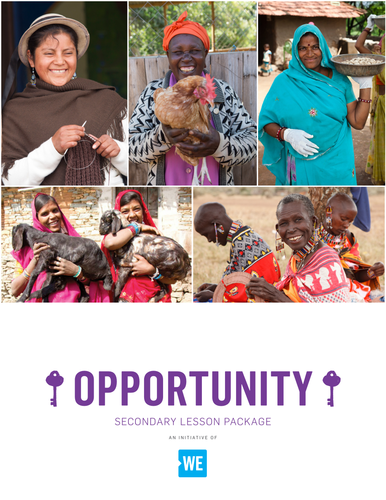

To empower women is to empower a nation. Alternative income programmes can help women gain the skills they need to become independent earners and generate enough income to support themselves and their families. When mothers have the education, tools and skills to earn a living, they are in a position to provide for their children, serve as role models to the younger generation of girls, and improve the financial and health outcomes of their community.
Free The Children’s WE Villages is an international development model that provides access to five key Pillars of Impact—Education, Water, Health, Food, and Opportunity—to empower a community with the means to forever lift itself from poverty. Why these five Pillars of Impact? Because together they can create powerful change. All five Pillars of Impact of the WE Villages model are owned and maintained by the community, and designed to be self-sustaining after the initial project implementation.
Since we initiated the Opportunity Pillar, 30,000 women have been provided with the tools for economic self-sufficiency. And this has had a direct impact on the health and welfare of their families and their communities.
In this lesson package, students will be introduced to the Opportunity Pillar, discuss the meaning of livelihood, explore the importance of gender equality and learn about alternative income projects. The lessons are grounded in the WE Schools Learning Framework, ensuring students develop the core skill sets that help them achieve the learning goals that contribute to the outcomes of creating a global citizen.
Each lesson in the package is organised into starters, main activities and plenaries, with suggestions for differentiation. Clear learning objectives and success criteria following Bloom’s Taxonomy of Learning ensure progression within each lesson and the package as a whole.
These lessons develop many aspects of character education and SMSC, with a holistic and tangible approach, encompassing local and global social awareness and action, and empowering young people to make positive changes in the world around them.
Free The Children’s WE Villages is an international development model that provides access to five key Pillars of Impact—Education, Water, Health, Food, and Opportunity—to empower a community with the means to forever lift itself from poverty. Why these five Pillars of Impact? Because together they can create powerful change. All five Pillars of Impact of the WE Villages model are owned and maintained by the community, and designed to be self-sustaining after the initial project implementation.
Since we initiated the Opportunity Pillar, 30,000 women have been provided with the tools for economic self-sufficiency. And this has had a direct impact on the health and welfare of their families and their communities.
In this lesson package, students will be introduced to the Opportunity Pillar, discuss the meaning of livelihood, explore the importance of gender equality and learn about alternative income projects. The lessons are grounded in the WE Schools Learning Framework, ensuring students develop the core skill sets that help them achieve the learning goals that contribute to the outcomes of creating a global citizen.
Each lesson in the package is organised into starters, main activities and plenaries, with suggestions for differentiation. Clear learning objectives and success criteria following Bloom’s Taxonomy of Learning ensure progression within each lesson and the package as a whole.
These lessons develop many aspects of character education and SMSC, with a holistic and tangible approach, encompassing local and global social awareness and action, and empowering young people to make positive changes in the world around them.
Something went wrong, please try again later.
This resource hasn't been reviewed yet
To ensure quality for our reviews, only customers who have downloaded this resource can review it
Report this resourceto let us know if it violates our terms and conditions.
Our customer service team will review your report and will be in touch.
£0.00